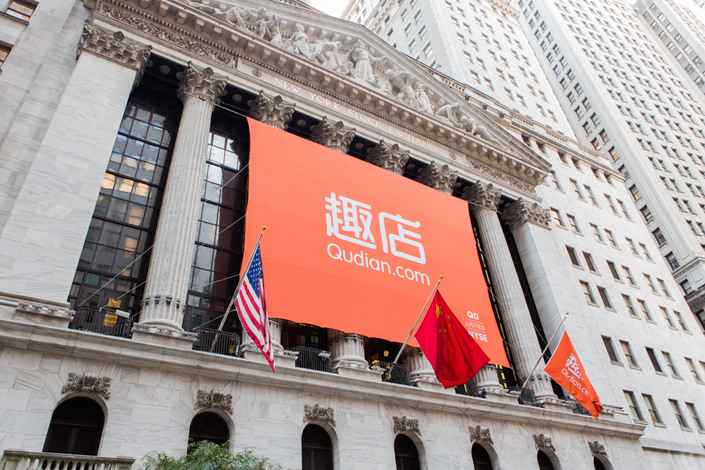China’s Online Lending Growth Stalls on Tighter Regulations

Two of China’s top players in the online lending sector — Qudian Inc. and LexinFintech Holdings Ltd. — are appearing to hold up well, both posting year-on-year growth in the third quarter. Their revenues, however, are down from the previous quarter due to stricter government regulations introduced and reinforced over the past year.
New York-listed online microlender Qudian Inc., which raised $900 million in October in one of the largest initial public offerings (IPOs) in the U.S. in 2017, reported total revenues of 1.93 billion yuan ($280.9 million) for the third quarter. This was up 32% year-on-year but marked a decline of 14% compared with the previous quarter, its financial report released on Wednesday showed.
The company said net income for the quarter was 683.8 million yuan ($99.6 million), a 5.1% increase year-on-year, but a 5.6% drop quarter-on-quarter.
Qudian’s revenue growth was largely attributed to sales income generated by its Dabai Auto business. It contributed 586.1 million yuan to total revenues compared to nil in the third quarter of 2017. Qudian moved earlier this year into auto financing to expand its business focus after the government ratcheted up scrutiny of the microloan sector.
However, despite the revenue from Dabai Auto, Qudian is already reassessing its commitment to the auto financing business. “With a focus on risk-adjusted profitability, we have further scaled down our budget car financing business as we emphasize our core small consumer credit businesses,” said Luo Min, founder and CEO of Qudian.
Only several months ago, Luo talked to Caixin about the company’s foray into auto financing and said “China’s new-car purchase market is huge.”
Another online lender, LexinFintech Holdings Ltd., posted total revenues of 1.7 billion yuan in the third quarter, a year-on-year increase of 17%, but a drop of 5% from the previous quarter. The company started trading on the Nasdaq in December 2017.
Lexin’s net income slumped by 32% from the previous quarter to 315 million yuan, but was up 363% from the same period last year.
Qudian and Lexin were among a large number of online microlenders hit by a regulatory storm that started late last year.
Authorities stepped up oversight of this spawning market amid concerns about unregulated lending activities and financial risks. They sought to bring the loosely regulated industry to heel after a string of scandals and fraud.
As of October, more than 2,400 peer-to-peer lending platforms had difficulties meeting cash withdrawal demands, saw their owners abscond with investor funds, or were investigated by police, according to a report (link in Chinese) by internet lending research firm Wangdaizhijia.
Given the uncertainties of the industry, several of Qudian’s shareholders cashed out in June as the cash-loan company posted worse-than-expected financial results for the first quarter.
The market caps of both Qudian and Lexin have been on a wild ride in their short time in the market.
Qudian’s market cap has tumbled to $1.91 billion from $11.67 billion on its first trading day last year in the U.S. Lexin also experienced a dip from its Nasdaq debut level of $1.75 billion last year to the current $1.6 billion.
Contact reporter Timmy Shen (hongmingshen@caixin.com)

- 1China Officials Dismiss Tax Hike Rumors After Tech Selloff
- 2Cover Story: How Gutter Oil Became a Prized Fuel for International Airlines
- 3Prominent Chinese Journalist Liu Hu Detained by Police in Chengdu
- 4Maersk Unit Takes Over CK Hutchison Panama Ports After Court Ruling
- 5China Provinces Set Cautious 2026 Growth Targets
- 1Power To The People: Pintec Serves A Booming Consumer Class
- 2Largest hotel group in Europe accepts UnionPay
- 3UnionPay mobile QuickPass debuts in Hong Kong
- 4UnionPay International launches premium catering privilege U Dining Collection
- 5UnionPay International’s U Plan has covered over 1600 stores overseas






